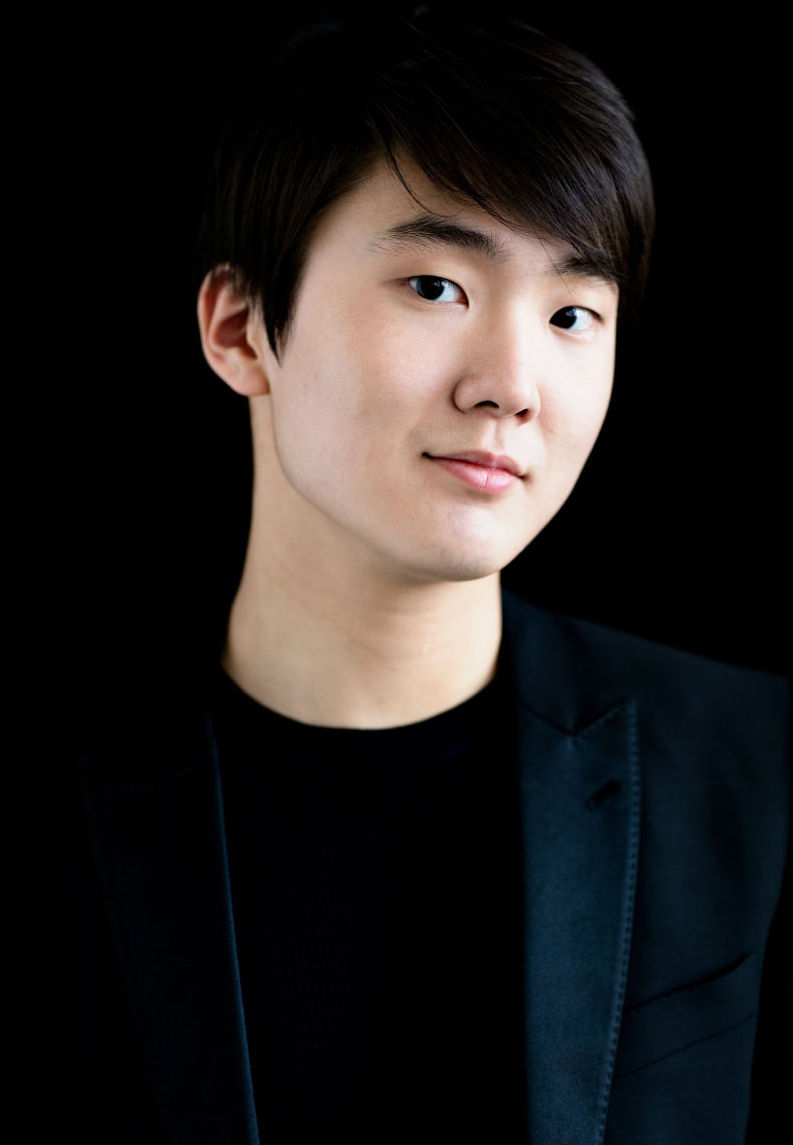Matthias Goerne, Seong-Jin Cho, Wigmore Hall review - slow and slower Strauss | reviews, news & interviews
Matthias Goerne, Seong-Jin Cho, Wigmore Hall review - slow and slower Strauss
Matthias Goerne, Seong-Jin Cho, Wigmore Hall review - slow and slower Strauss
A disappointingly one-geared Lieder recital

Matthias Goerne has an exceptional ability to sustain evenness and legato through a vocal line. His breath control and his tone production are things to be marvelled at. He is able to function at impossibly slow tempi, and to make an audience hold its collective breath in admiration. The problem comes when he performs a recital programme which sets out to prove that point. Again and again. All evening.
I was probably in a minority, because this Wigmore Hall recital, with the 23-year old South Korean-born pianist Seong-Jin Cho, was loudly applauded at the end of each half. But I found the evening distinctly and increasingly one-geared. Goerne and Cho have taken this recital to Vienna and Paris. This was the third and last performance of a short tour.
 Programme-building, as they say, doesn’t get tougher than this: take a series of songs by Richard Strauss. Jettison anything marked either lebhaft (lively) or heiter (joyful), and select only the Lieder marked either langsam (slow) or ruhig (quiet). Then perform them at snail's pace. It is to the immense credit of pianist Seong-Jin Cho (pictured right by Harald Hoffmann for DG) that he was able to sustain interest through piano postludes, although by the end of the recital it was hard not to be aware of an understandable rustling and fidgeting coming from the audience.
Programme-building, as they say, doesn’t get tougher than this: take a series of songs by Richard Strauss. Jettison anything marked either lebhaft (lively) or heiter (joyful), and select only the Lieder marked either langsam (slow) or ruhig (quiet). Then perform them at snail's pace. It is to the immense credit of pianist Seong-Jin Cho (pictured right by Harald Hoffmann for DG) that he was able to sustain interest through piano postludes, although by the end of the recital it was hard not to be aware of an understandable rustling and fidgeting coming from the audience.
The inclusion of Wagner’s “Five Songs for a Woman’s Voice”, the Wesendonck-Lieder, was an interesting curiosity. Goerne sings Kurwenal and Wotan, and to hear the songs transposed into his tessitura did throw a different light on them. But the centre-piece was “Schmerzen”, where the instruction at the head of the song, langsam und breit (slow and broad), was, as ever, taken up with more relish than strictly necessary. Goerne and Cho did not make a particularly strong case for, or go particularly deeply into the unfamiliar songs of Hans Pfitzner, although his development from 19th-century charm into the lusher chromaticism of the early 20th century was interestingly charted.
Goerne was using printed scores throughout the programme, often looking down or turning pages. There was the occasional verbal slip-up. In other words this was not a recital geared towards communication or complicitness with an audience; it was more about display and revelling in Goerne’s glorious sound. And that made the whole event a rather limiting and disappointing experience.
rating
Explore topics
Share this article
Add comment
The future of Arts Journalism
You can stop theartsdesk.com closing!
We urgently need financing to survive. Our fundraising drive has thus far raised £49,000 but we need to reach £100,000 or we will be forced to close. Please contribute here: https://gofund.me/c3f6033d
And if you can forward this information to anyone who might assist, we’d be grateful.

Subscribe to theartsdesk.com
Thank you for continuing to read our work on theartsdesk.com. For unlimited access to every article in its entirety, including our archive of more than 15,000 pieces, we're asking for £5 per month or £40 per year. We feel it's a very good deal, and hope you do too.
To take a subscription now simply click here.
And if you're looking for that extra gift for a friend or family member, why not treat them to a theartsdesk.com gift subscription?
more Classical music
 From Historical to Hip-Hop, Classically Black Music Festival, Kings Place review - a cluster of impressive stars for the future
From quasi-Mozartian elegance to the gritty humour of a kitchen inspection
From Historical to Hip-Hop, Classically Black Music Festival, Kings Place review - a cluster of impressive stars for the future
From quasi-Mozartian elegance to the gritty humour of a kitchen inspection
 Shibe, LSO, Adès, Barbican review - gaudy and glorious new music alongside serene Sibelius
Adès’s passion makes persuasive case for the music he loves, both new and old
Shibe, LSO, Adès, Barbican review - gaudy and glorious new music alongside serene Sibelius
Adès’s passion makes persuasive case for the music he loves, both new and old
 Anja Mittermüller, Richard Fu, Wigmore Hall review - a glorious hall debut
The Austrian mezzo shines - at the age of 22
Anja Mittermüller, Richard Fu, Wigmore Hall review - a glorious hall debut
The Austrian mezzo shines - at the age of 22
 First Person: clarinettist Oliver Pashley on the new horizons of The Hermes Experiment's latest album
Compositions by members of this unusual quartet feature for the first time
First Person: clarinettist Oliver Pashley on the new horizons of The Hermes Experiment's latest album
Compositions by members of this unusual quartet feature for the first time
 Gesualdo Passione, Les Arts Florissants, Amala Dior Company, Barbican review - inspired collaboration excavates the music's humanity
At times it was like watching an anarchic religious procession
Gesualdo Passione, Les Arts Florissants, Amala Dior Company, Barbican review - inspired collaboration excavates the music's humanity
At times it was like watching an anarchic religious procession
 Classical CDs: Camels, concrete and cabaret
An influential American composer's 90th birthday box, plus British piano concertos and a father-and-son duo
Classical CDs: Camels, concrete and cabaret
An influential American composer's 90th birthday box, plus British piano concertos and a father-and-son duo
 Cockerham, Manchester Camerata, Sheen, Martin Harris Centre, Manchester review - re-enacting the dawn of modernism
Two UK premieres added to three miniatures from a seminal event of January 1914
Cockerham, Manchester Camerata, Sheen, Martin Harris Centre, Manchester review - re-enacting the dawn of modernism
Two UK premieres added to three miniatures from a seminal event of January 1914
 Kempf, Brno Philharmonic, Davies, Bridgewater Hall, Manchester review - European tradition meets American jazz
Bouncing Czechs enjoy their Gershwin and Brubeck alongside Janáček and Dvořák
Kempf, Brno Philharmonic, Davies, Bridgewater Hall, Manchester review - European tradition meets American jazz
Bouncing Czechs enjoy their Gershwin and Brubeck alongside Janáček and Dvořák
 Solomon, OAE, Butt, QEH review - daft Biblical whitewashing with great choruses
Even a top soprano and mezzo can’t make this Handel paean wholly convincing
Solomon, OAE, Butt, QEH review - daft Biblical whitewashing with great choruses
Even a top soprano and mezzo can’t make this Handel paean wholly convincing
 Two-Piano Gala, Kings Place review - shining constellations
London Piano Festival curators and illustrious friends entertain and enlighten
Two-Piano Gala, Kings Place review - shining constellations
London Piano Festival curators and illustrious friends entertain and enlighten
 Echo Vocal Ensemble, Latto, Union Chapel review - eclectic choral programme garlanded with dance
Beautiful singing at the heart of an imaginative and stylistically varied concert
Echo Vocal Ensemble, Latto, Union Chapel review - eclectic choral programme garlanded with dance
Beautiful singing at the heart of an imaginative and stylistically varied concert
 Scott, Irish Baroque Orchestra, Whelan, RIAM, Dublin review - towards a Mozart masterpiece
Characteristic joy and enlightenment from this team, but a valveless horn brings problems
Scott, Irish Baroque Orchestra, Whelan, RIAM, Dublin review - towards a Mozart masterpiece
Characteristic joy and enlightenment from this team, but a valveless horn brings problems

Comments
Sorry, but I totally disagree
No need to apologise!